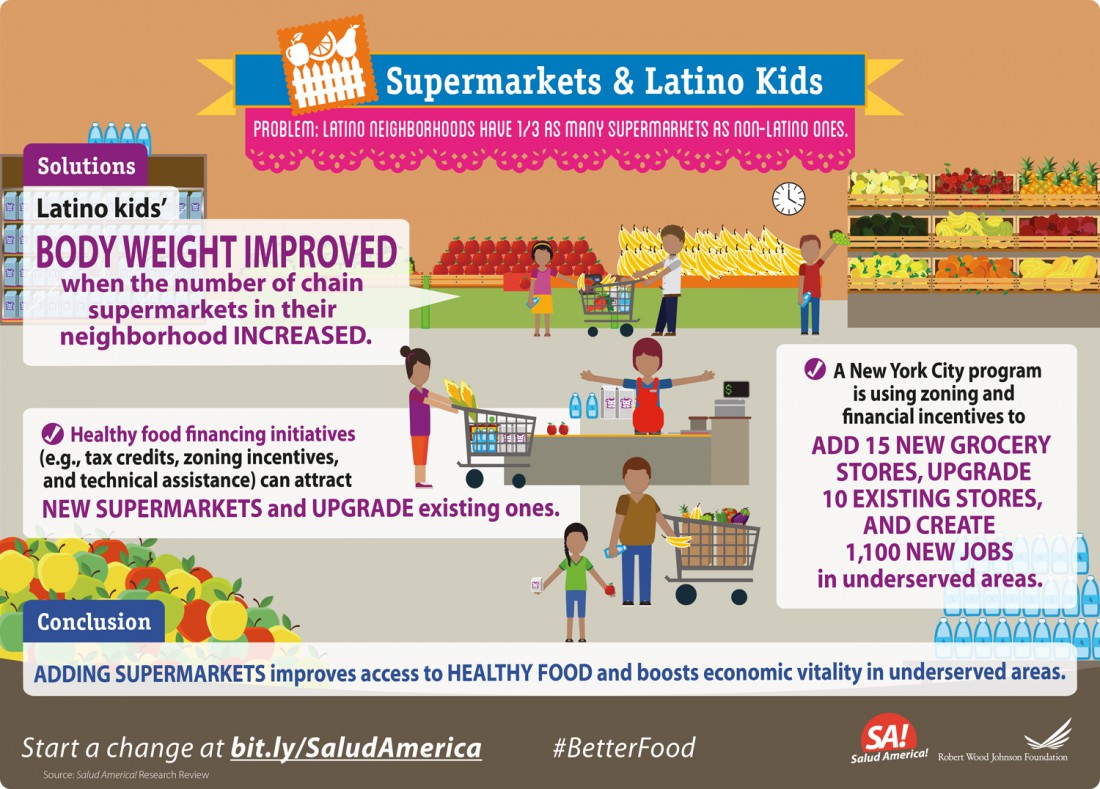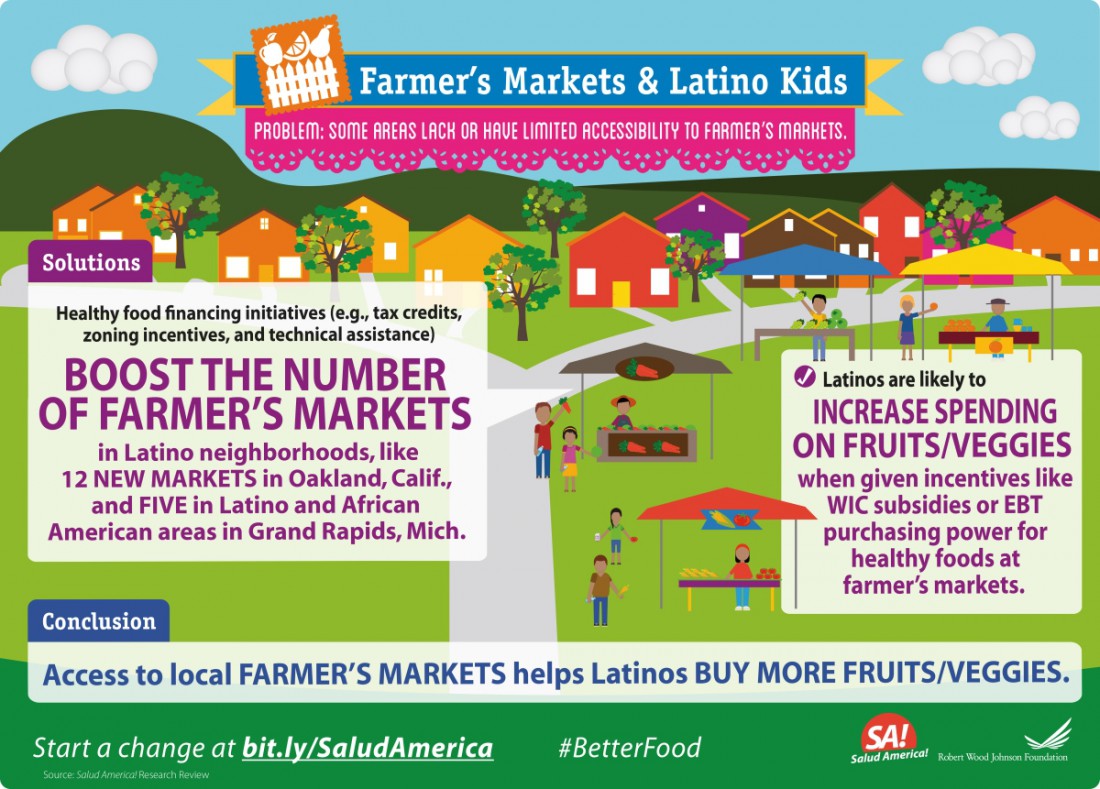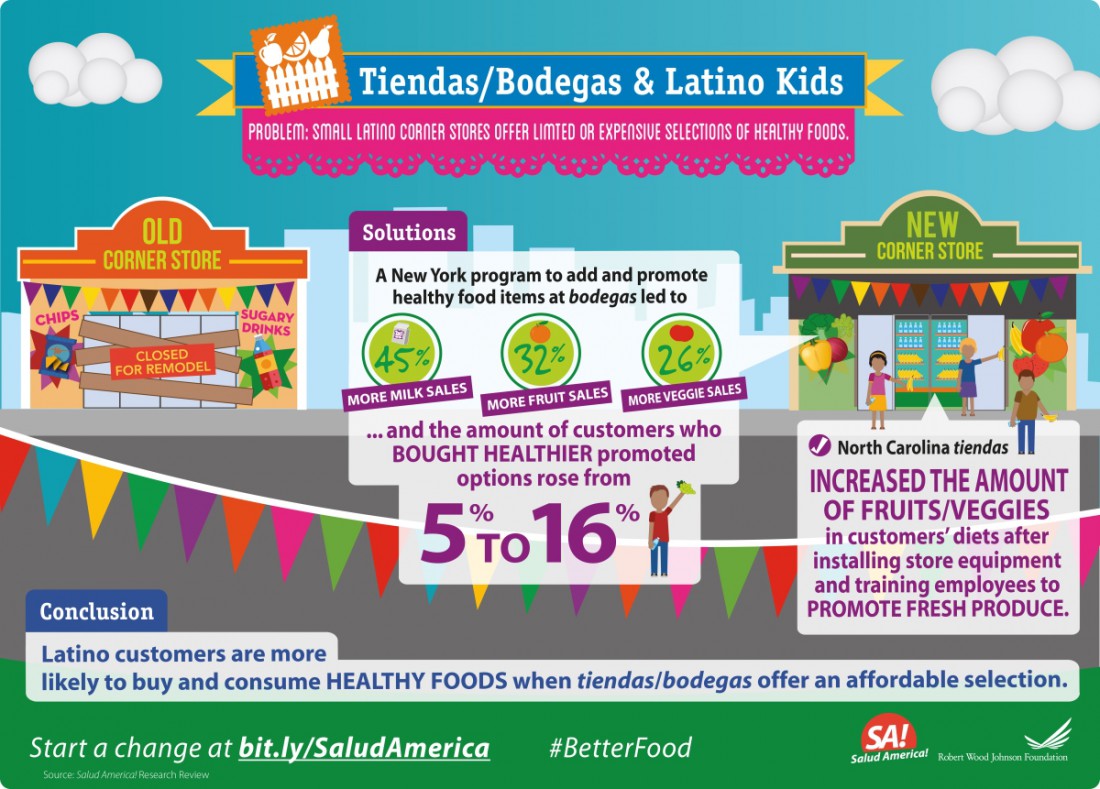Share On Social!
Healthy food is important to health for all people.
Yet fast food and corner stores outnumber supermarkets and farmers’ markets in many neighborhoods, including Latino neighborhoods. This results in overconsumption of unhealthy foods, and more risk of obesity.
Fortunately, healthy food financing initiatives can boost access to healthy, affordable foods. This happens when supermarkets and farmers’ markets get certain incentives to develop their businesses in certain areas.
Groups also can help corner stores to expand their inventory of healthy, affordable foods.
Also, more marketing of healthy foods, and less of junk foods, can help spur desirability.
See the Full Research Review with references (PDF)
Read the Issue Brief in English (PDF)
Read the Issue Brief in Spanish (PDF)
Video in Spanish
Contents
Introduction & Methodology. This Salud America! research review is an assessment of available research about families’ access to healthy food. This review examines relationships between supermarket availability, other healthy food access and consumption, and obesity, including among Latinos, who represent nearly one of five US people. Ongoing financing initiatives and governmental programs to improve healthy food consumption in low-income neighborhoods are summarized.
Key Research Findings

Access to healthy food. Latino neighborhoods sometimes have 1/3 as many supermarkets as others.
Supermarkets. Latino kids’ body weight outcomes improved when the number of chain supermarkets in their neighborhood increased.
Healthy food financing initiatives (e.g., tax credits, zoning incentives) can attract new supermarkets and upgrade existing ones. For example, a New York City program uses zoning and financial incentives to add 15 new grocery stores, upgrade 10 existing stores, and create 1,100 new jobs in underserved areas.

Farmer’s markets. Access to a local farmer’s market helps Latinas buy more fruits and veggies.
WIC and SNAP. Latinos are likely to increase spending on fruits/veggies when given incentives like EBT purchasing power for healthy foods at farmer’s markets.
Corner stores. A New York program to add and promote healthy food items at bodegas led to 45% more milk sales, 32% more fruit sales, and 26% more veggie sales.

The amount of customers who bought healthier promoted options rose from 5% to 16%.
Marketing of unhealthy food. Two studies found that ads to Spanish-speaking youth are more likely to promote unhealthy foods than ads to English-speaking youth.
Conclusions
Policy Implications. Local governments should encourage supermarkets, farmers’ markets or other healthy food sources to operate in communities through zoning, land-use planning, and community development efforts. Policymakers should support programs and technologies that enable low-income populations to buy food at farmers’ markets, or expand corner stores availability and promotion of healthy options.
Future Research Needs. Future research should examine the degree to which increased access to local healthy foods impacts dietary habits and obesity in all communities, including Latino communities. Researchers also should account for multilevel factors (for individuals, at homes, in neighborhoods, counties and cities) that contribute to obesity and health outcomes, such as lack of time in preparing healthy foods, prices for healthy foods, and the influence of fast-food. Additional research should examine specific factors in Latino communities that might influence the effectiveness of policies to improve access to affordable healthy foods, as well as assess what implementation strategies work best for this population.
Full Research Review with References
See the Full Research Review with references (PDF)
About the Authors
- Amelie G. Ramirez, Dr.P.H., Director, Salud America!, Professor, Institute for Health Promotion Research, UT Health San Antonio
- Kipling J. Gallion, M.A., Deputy Director, Salud America!, Assistant Professor, Institute for Health Promotion Research, UT Health San Antonio
- Allyson Perry, Ph.D.
- Margie Patlak, M.S., MargiePatlak.com
This report is copyright 2017 RWJF, Route 1 and College Road, P.O. Box 2316, Princeton, NJ, 08543-2316, www.rwjf.org.
Explore More:
Healthy FoodBy The Numbers
1
Supermarket
for every Latino neighborhood, compared to 3 for every non-Latino neighborhood



